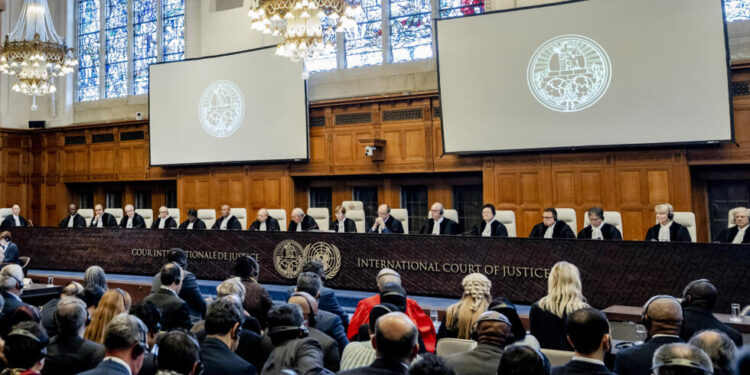The International Court of Justice (ICJ) yesterday ruled that Israel must take all measures to prevent genocidal acts in Gaza, but did not order an immediate halt to the war.
Judges at the top United Nations court delivered an interim ruling in South Africa’s genocide case against Israel.
The International Court of Justice, also known as the World Court, located in The Hague, Netherlands, is the only international court that adjudicates on general disputes between nations, and gives advisory opinions on international legal issues.
Article 94 establishes the duty of all United Nations members to comply with decisions of the court involving them. If they do not comply, the issue may be taken before the UN Security Council for enforcement. However, if the judgment is against one of the five permanent members of the Security Council or its allies, any resolution on enforcement could then be vetoed by that member.
After yesterday’s ruling, the Palestinian foreign minister, Riyad al-Maliki, said the judges ruled “in favour of humanity and international law”.
But Israeli defence minister, Yoav Gallant, dismissed the ruling for Israel to do more to ensure it prevents any acts that could be considered genocidal.
He said; “The state of Israel does not need to be lectured on morality in order to distinguish between terrorists and the civilian population in Gaza,” he posted on social media, calling South Africa’s submission “anti-semitic”.
“The IDF and security agencies will continue operating to dismantle the military and governing capabilities of the Hamas terrorist organisation, and to return the hostages to their homes. I have full confidence in our troops,” he said.
Israel’s foreign minister Israel Katz also took to social media to say his country was committed to international law and existed “independently of any ICJ proceedings”, as did “Israel’s right to defend itself”.
Following the ICJ’s ruling, he told Israel’s legal team: “You have represented Israel and the Jewish people with honour. You have made us proud.”
South Africa welcomed the ruling, calling it a “decisive victory”.
South African President Cyril Ramaphosa said the ICJ ruling must be respected by all who recognise the court, including Israel.
Speaking after the ruling on the application brought by his country, Ramaphosa said South Africa expected Israel, “as a self-proclaimed democracy, and as a state that respects the rule of law,” to abide by the ruling.
South Africa’s foreign minister Naledi Pandor who spoke to journalists outside the court, said without a ceasefire in Gaza, “the order doesn’t actually work”.
“I would have wanted that the word cessation is included in the judgement but I’m satisfied with the directions that have been given,” she said.
Asked by a journalist whether she thinks Israel would conform to the orders, she replied she had never really been hopeful about Israel, but hoped the country’s “powerful friends” would advise it to comply with the order.
The South African government has also released a statement welcoming the court orders and calling the judgement a landmark ruling.
Under the measures, Israel has been told to do all in its power to stop genocide there, immediately enable more urgently needed aid to enter the territory and to prevent and punish the direct incitement of genocide in the conflict.
South Africa accused Israel of committing genocide against Palestinians.
Israel vehemently denies the accusation and is thought likely to ignore orders by the judges who have no way of enforcing their decision.
Reacting to the judgement, Israel’s Prime Minister Benjamin Netanyahu said Israel would “continue to defend ourselves and our citizens while adhering to international law”.
Netanyahu added that Israel will “continue this war until absolute victory” and until “all hostages are returned”. It could take years before the ICJ gives a final judgement on the claim of genocide.
Meanwhile, Mark Regev, a senior adviser to the Israeli prime minister said South Africa “failed to meet their objective” to force a ceasefire in the Israel-Gaza conflict.
“The most important thing is that the court rejected South Africa’s astonishing, preposterous demand that Israel not be given the right to defend itself,” Regev told the BBC.
Regev said Israel hasn’t indicated that it would not follow the International Court of Justice’s instructions but said it was “preposterous” and “obscene” that the convention aimed at preventing genocide was being manipulated by Hamas through South Africa.
He added that Israel’s response to the October 7 attacks had been “in coordination with international law” and questioned the Gaza death toll of nearly 26,000, saying it came from the Hamas-run health ministry and that the ICJ justices themselves said there was no way to verify the number.
“We are sure in Israel that a large number [of people killed in Gaza are combatants and therefore legitimate targets for Israel’s military operation,” he said.
Meanwhile, US media report that the head of the CIA is due to meet Israeli, Qatari and Egyptian officials in the coming days to discuss a new potential ceasefire in Gaza.
Israel’s retaliatory attacks in Gaza are said to have killed 25,900 people, mostly women and children, according to the Hamas-run health ministry. But Israel has said many of those killed were Hamas fighters.
The war began after Hamas attacked southern Israel on October 7 last year, killing about 1,300 people, mostly civilians, and taking 240 hostages.



